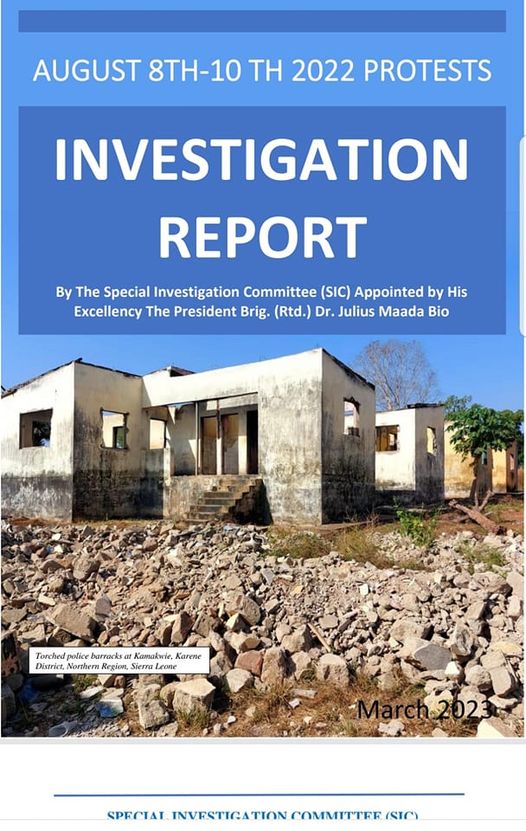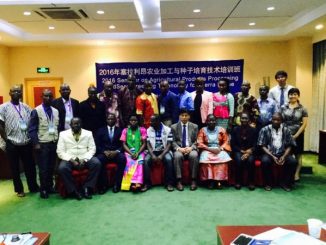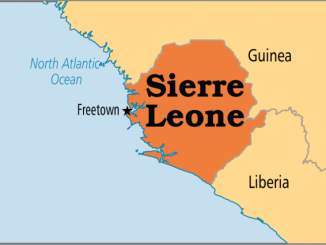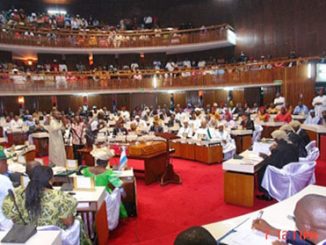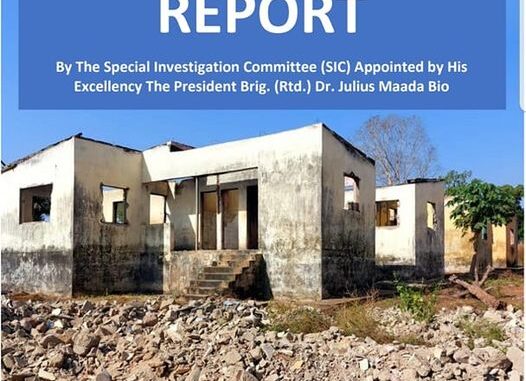
SPECIAL INVESTIGATION COMMITTEE (SIC)
REPORT ON THE 8th -10th AUGUST 2022 PROTESTS
Executive Summary
On the 8th, 9th and 10th of August 2022, violent protests sprouted from various parts of Sierra Leone which disturbed the peace and stability of the State. His Excellency the President Brig (Rtd.) Dr Julius Maada Bio thereafter appointed a Special Investigation Committee (SIC) on 24th August 2022, to investigate the incidents.
The Committee comprised various heads of Government institutions and professional bodies that were to investigate who were the organisers, planners and funders of the protests, identify the root causes and make recommendations to the Government of Sierra Leone (GoSL) on what needs to be done to prevent a re-occurrence of such incidents.
Subsequently, meetings were held in Lungi, Port Loko, Lunsar and Kamakewie, Makeni, Binkolo, Magburaka and the Western Area; and in selected locations where the protests did not take place- Kono, Kenema and Bo. In order to gather empirical evidence, the SIC met with various other entities and persons of interest and asked questions related to the events.
The information gathered from this investigation informed the Committee’s analysis of, and conclusion on, the August 8th -10th 2022 occurrences, as well as proffering recommendations to address the underlying causes.
The Committee’s findings were that though there were incessant complaints of youth unemployment and marginalisation, substance abuse, economic hardship and food insecurity, these were not a justification for the level of violence perpetrated in the country. The indications are that they may have genuinely contributed to the August 8th to 10th incidents with rogue politicians exploiting this reality to their political advantage. Social media was awash with hate messages and tribal bigotry perpetrated by one Will Kamara, alias Adebayor, and his cohorts under the umbrella of the People’s Power in Politics (PPP).
Therefore, from the evidence gathered, the SIC will not attribute the activities of 8th to 10th August 2022 solely to socio-economic problems confronting Sierra Leone but that the incidents connotated an insurrection against the central government, underpinned by strong political vendetta exhibited on social media and other platforms.
The insurrection was well-planned, financed, well-orchestrated, timed and geared towards destroying public property and undermining the peace and stability of the state by removing the legitimate and democratically elected President of the Republic of Sierra Leone, Brig. (Rtd) Dr Julius Maada Bio, from political power. This was exemplified in words like “Maada Bio must go!”. Additionally, in Lungi in particular, the Committee found out that protesters attempted to enter the airport (critical national infrastructure) to dig out the runway to prevent the President from returning home from his overseas travel. Several Police stations were vandalised with some looted, torched and weapons carted away. The use of dangerous weapons including machetes, guns and sticks against state security personnel, to a point of murdering six (6) of them in cold blood (injuring another who later died in hospital), and about twentyone (21) civilians losing their lives, could not be considered a peaceful protest.
While at the national level, there was no evidence that the leadership of the main opposition All People’s Congress (APC) supported the insurrection based on their public condemnation of the incidents, at the subnational level it was found that the ringleaders of the insurrection were all active members of the APC. In Lungi, Port Loko, Kamakwei and Makeni the SIC was provided with names of individuals who were involved in the planning and execution of the incidents by providing PPP t-shirts, placards, water and food to protesters. Senior members of the party were also seen publicly associating with rioters who were arrested and detained at various police stations, and some even provided free legal services for them giving a semblance of tacit support for the insurrection.
The Security Sector was relatively prepared but was not proactive enough to forestall the infamous incidents. This could be attributed to a myriad of factors key amongst which was command and control both within the Sierra Leone Police (SLP) and the Republic of Sierra Leone Armed Forces (RSLAF) during the period of the incidents. A new Inspector General of Police (IGP) had just been appointed and the Chief of Defence Staff and his Assistant Chief of Defence Staff Operations and Planning were out of the country. Furthermore, the Committee found out that the intelligence provided by the security sector was inadequate to effectively support the preparedness of the sector for operations during that critical period. The SIC found out that whilst in areas where no incident took place, the Provincial and District security committees were proactive the same cannot be said for areas where the incidents occurred.
Moreover, the security sector was seriously challenged by the paucity of resources, including vehicles, communication equipment, riot gear, etc. to adequately respond to the threats facing the nation at that time.
The Emergency Military Aid to Civil Power (E-MACP) was invoked by the National Security Council (NSC) on 9th August 2022 but was only operationalized on 10th August 2022 when the insurrection was already underway. However, the RSLAF was professional in providing support to the SLP to quell the insurrection.
The SIC found out that the authority of the traditional leaders has been eroded in many communities across the country. Complaints of a severe disconnect between them and the central government were rife, which left a lacuna for politicians to manipulate their subjects, thus undermining their authority. There were also lamentations about the lack of information on key governance issues that impact the lives and livelihoods of their subjects.
The Telecommunications Sector seems to be largely unregulated and is reported to be using outdated equipment that does not meet the standards of contemporary telecommunications operations in the country. Thus, the Committee found it impossible to trace monies that were transferred electronically for the organization of the insurrection. This is due to the fact that the
National Telecommunications Authority (NATCA) does not have the capacity to comprehensively monitor electronic activities conducted by Mobile Network Operators (MNOs). Where it has such capacity, it is undermined by various interests within and outside of government that are related to and benefiting from telecommunications companies. The banks and money transfer businesses were also not helpful to the SIC in providing information on financial transactions that may have been related to the insurrection. The Financial Intelligence Unit (FIU) with its numerous challenges assisted the investigation by providing names of some numbers of interest that did not give any significant information for the purposes of this investigation.
The claims of extra-judicial killings following the August 10th protests could not be ascertained based on evidence collected from engagements with various stakeholders, including the security sector in all the areas visited by the SIC. There was no information provided on either missing persons or summary executions despite repeated enquiries. However, public allegations of extra-judicial killings especially during curfew hours following the insurrection should further be looked into.
Over 24 children who directly participated in the riot were arrested by the police from different parts of the country, particularly in Freetown, Waterloo, Lungi, and Makeni. Apparently, children were used as human shields by the adult rioters. Some children who were arrested in Freetown reported that they were recruited from Makeni and Portloko and brought to Freetown to participate in the riot. These children were already living in the streets and recruited from there. Whilst the Committee recognises the rights of children to protest, it equally recognises their rights not to be engaged in perpetrating violence and hostilities. The children arrested were however handed over to the Ministry of Social Welfare and a task force of Child Justice actors including UNICEF, Defence for Children International, Don Bosco, and Family Homes Movement in Freetown. The task force members and the Ministry of Social Welfare traced the families of these children and reunified them in Freetown, Lungi, Port Loko, and Makeni. Despite the fact that children who participated in the incidents were under the influence of the adult organisers, the Committee notes that there are limited opportunities and spaces for children to communicate their views and opinions with the government and also participate in governance processes and decision-making. The lack of such spaces may also trigger child-led protests that may lead to violence and loss of lives and property.
The SIC noted that the insurrection of 8th-10th August 2022 had devastating consequences, firstly on individuals and their families who lost their loved ones and on the State of Sierra Leone, in general. The wanton destruction of lives and property has created a spectacle to the world that Sierra Leone has not learnt any lessons from the conflict it went through two decades ago (1991-2002). The August incidents will significantly affect Foreign Direct Investment (FDI) into the country which will subsequently affect the country’s developmental strides as outlined in the Medium-Term National Development Plan (2019-2023). More worrisome, is that the deep tribal, regional and political divide manifested before, during and after these incidents will continue to further undermine national cohesion and stifle socio-economic development.
To prevent a recurrence of these unfortunate events of 8th-10th August 2022, the SIC makes the following recommendations:
The Security Sector
▪ SLP should upscale professionalism and contemporary policing standards in the police force devoid of partisan politics and revitalise all Local Police Partnership Boards (LPPB) nationwide. Ensure that the recruitment of police officers has a national character and is transparent.
▪ Embark on sustained training of police officers in contemporary policing to avoid highhandedness in the discharge of their duties fully cognisant of human rights. Strive to improve the police-citizens’ relationship.
▪ Properly equip the SLP with logistics such as vehicular fleet, communications and crowd control equipment to deliver professional policing. A similar consideration must be made for the RSLAF.
▪ GoSL should support the Intelligence Services with modernised equipment to be able to provide quality intelligence in a timely manner to support security operations.
▪ Office of National Security (ONS) to strengthen the security sector coordination apparatus through the provision of adequate resources to meet this important national requirement, especially for subnational security structures, e.g., Provincial Security Committees (PROSECS), District Security Committees (DISECS) and Chiefdom Security Committees (CHISECS).
▪ Review the conditions of service of security sector personnel, especially their remuneration.
▪ Parliament should strengthen its oversight responsibility of the security sector.
The Justice System
▪ GoSL should support contemporary reforms in the justice system that will guarantee the speedy dispensation of criminal and civil justice.
▪ The Judiciary is to maintain its independence, neutrality and impartiality at all times.
▪ GoSL should insulate the judiciary from the financial competition with other Ministries, Departments and Agencies (MDAs) on its annual allocation of resources and to improve the welfare of judicial officers.
▪ The introduction of custodian-suspended sentences for minor offences will contribute immensely to decongesting correctional facilities countrywide.
▪ Improve judiciary outreach into rural communities to get citizens to know what the judiciary is doing and can have confidence in the system.
The Economy
▪ GoSL should continue fiscal adjustments and management of debts to reduce economic vulnerabilities.
▪ Continue to implement policies that will reduce the impact of COVID-19 expenditure and other global shocks on the economy and improve livelihoods.
▪ Support Small and Medium Enterprises (SMEs) to become engines of economic growth and creation of jobs as this will hugely support the livelihoods of a greater percentage of the population.
▪ Continue to work on a National Strategy to strengthen financial products and services with a view to reducing the burden on GoSL SME financing.
▪ Continue to develop and implement policies that will beanbag economic shocks and vulnerabilities to strengthen the economic recovery.
▪ Employ aggressive monitoring of the nation’s financial systems to minimize financial criminality.
▪ GoSL should create and enforce policies that will discourage monopoly on basic commodities that impact the lives and livelihoods of the people e.g., fuel, rice, sugar, oil, onions etc.
▪ GoSL should develop policies that prioritize local industrialisation for the production of basic amenities that will reduce importation and subsequently save much-needed foreign exchange.
▪ Operationalize the Consumer Protection Act of 2020 and capacitate the Standards Bureau to effectively monitor the quality of goods imported into the country.
▪ The Bank of Sierra Leone should put in place policies and programmes that will stabilize the local currency, and check the dollarization of the economy.
Politics
▪ GoSL tshould increase political engagement with opposition political parties.
▪ The opposition political parties are to constructively engage in national governance and development issues.
▪ The opposition are to recognise that there is a democratically elected Government in place that must be recognised and supported throughout the country.
▪ The EMBs are to provide a level playing field for the conduct of transparent, accountable and credible elections.
▪ Both the ruling Government and opposition parties should tone down political rhetoric, hate speech, tribal bigotry and violence.
▪ Strengthen District Monitoring Committees that monitor Political Parties Code of Conduct.
▪ Provide Public Education on the Proportional Representation Electoral System which is to be used in the 2023 polls.
▪ Provide training in election management for Elections Commission Sierra Leone (ECSL) staff to maintain public confidence in the democratic process which is a critical element for good governance.
▪ Security Sector should be well-trained, exhibit professionalism and be independent and non-partisan in providing security for the elections.
Youth Unemployment
▪ Review the curriculum of universities to provide practical rather than just theoretical and elitist skills that will enable trained youth to be absorbed into the job market.
▪ Intensify youth and women employment through upscaling of Technical and Vocational Education and Training (TVET) centres to provide youth skills and entrepreneurship that are relevant to the job market.
▪ Continue to create the enabling environment for viable private sector investment free of predation and restrictions so as to provide jobs for skilled youth.
▪ Direct public sector activities to open up critical infrastructure that will attract private sector investment e.g., roads, energy, etc.
▪ Create opportunities for youth to access credit facilities and business capital to set up their own businesses in the informal sector.
Children
▪ GoSL should strengthen and enforce legislations that criminalize the involvement of children in violence and hostilities, including riotous protests organised by adults and adult-led groups.
▪ Individuals or groups involving children in hostilities must be held accountable for their actions.
▪ GoSL should establish child-friendly mechanisms that allow children to freely express their views and communicate their grievances to the government.
▪ Parliament of Sierra Leone should ratify the Optional Protocol to the United Nations Convention on the Rights of the Child on Communication (OP3) and establish childfriendly mechanisms that can receive and investigate communication (complaints) from children.
▪ GoSL and child protection partners should implement prevention programmes such as life skills initiatives, good parenting programmes, recreation programmes and other initiatives that can positively engage the minds of children particularly those at risk such as children living in the streets.
▪ Community leaders and parents should serve as moral guarantors to the promote culture of peaceful co-existence, respect and good behavior among children at community level.
Authority of Traditional Rulers
▪ The initiative by the Executive to recently engage all Paramount Chiefs was quite timely and laudable and it may be prudent to sustain these engagements in support of good governance.
▪ Conduct training for Paramount Chiefs on contemporary approaches to leadership and how to encourage subjects to respect their authority.
▪ Paramount chiefs should not get involved in partisan politics as this does not augur well for peace and harmony.
▪ GoSL should continue the devolution of authority that will strengthen the role of traditional leaders in their localities.
▪ In the process of devolution, the MDAs are to collaborate instead of competing with traditional leaders on governance and development endeavours in their communities.
Communication
▪ GoSL should invest in national information and communication infrastructure.
▪ GoSL should strengthen and facilitate digital migration for the Public Broadcaster, Sierra Leone Broadcasting Cooperation (SLBC) and provide modernised equipment and resources to support its District stations across the country.
▪ GoSL should provide additional resources to the Ministry of Information and Communication to enable the Strategic Communication Unit (SCU) to communicate Government activities nationwide.
Media
▪ GoSL should improve its capability of tracking the activities of cybercriminals and peddlers of negative and inciteful social media information likely to compromise the security of the State.
▪ GoSL and International Partners should provide support to the IMC and SLAJ to capacitate journalists to be independent, professional and ethical in practising their profession.
▪ IMC and SLAJ should ensure strict compliance to the Print and Electronic Media Regulations 2023 and the Code of Ethics by media houses and journalists.
▪ Government and the opposition should take concrete action to discourage intimidation, threats, and physical attacks against media and civil society practitioners before, during and after elections.
Infrastructure
▪ The ONS should ensure that the National Security Policy and Strategy (NSPS) protects all critical national infrastructure as they are vital to the survival of the State.
Protest Killings
▪ The SIC is recommending that further investigations be conducted to verify the exact number of civilians who lost their lives during the insurrection.
Alleged Extra-Judicial killings
▪ A targeted independent investigation should be done to discern the true story of the death of Hassan Dumbuya alias Evangelist Samson.
▪ The SIC could not ascertain the veracity of allegations against some government officials for extra-judicial killings. It is recommended that affected families of these alleged killings should come forward and provide evidence to substantiate these serious allegations.
International Community
▪ The International Community should remain neutral on sensitive political issues in the country.
▪ Statements or utterances that would inflame political tension and undermine the security and stability of the country should be avoided. The margin of appreciation for the continued existence of the state always lies with the government.
▪ The International Community must continue to play its critical role in supporting GoSL, Political Parties, Civil Society and the Media to maintain peace and stability, and strengthen democracy, rule of law, accountability and service delivery.
OTHER BITS AND PIECES FROM THE REPORT, AS REPORTED BY VARIOUS MEDIA
“The August 8th-10th incidents, as insidious as it was, did not occur in isolation and were not extemporaneous, as suggested by multiple pieces of evidence collated from existing literature and, clues gleaned from observations and interviews and narratives assembled from public and in-camera engagements,” they Committee stated, adding that, “Therefore, the events of 8th-10th August 2022 can be conclusively regarded as an insurrection against the central government. The insurrection was planned, well-orchestrated, timed, and geared towards destroying public property provided by the state to undermine the government’s authority.”
“Engagements with the youth, women, traditional leaders, and other stakeholders in all the areas visited for this investigation revealed a lack of information about key governance issues that impact their lives and livelihoods,” the SIC disclosed, adding that, “Furthermore, they informed the Committee that the social interaction with government authorities to channel their grievances and frustrations was limited.”
During the investigation, the SIC noted that the mainstream media helped disseminate relevant information to the public and provided.
The Committee however noted that in the east end of Freetown, four radio stations; Tumac Radio, Justice FM, Citizens Radio, and Radio Tempo were reported by residents in those areas to the IMC of broadcasting disturbing political messages before, during, and after the August 10th protests, of which the IMC was swift to intervene.
The investigation further discovered that police personnel was targeted and killed accounting for the loss of Seven (7) police officers and Twenty-One (21) civilians.
The Committee found that no political party at the national level was involved in organizing or planning the event. The SLPP, APC. NGC and C4C leadership all condemned the violent outcomes of the insurrection.

